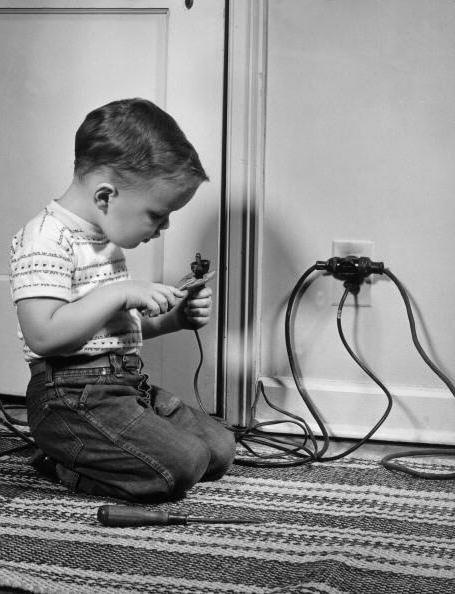Questions to Ask Yourself About Your Home Electrical System
 Do circuit breakers in your home trip often or do fuses keep blowing?
Do circuit breakers in your home trip often or do fuses keep blowing?
A home electrical system has these built-in safeguards to prevent electrical overload. Too much current causes the breakers to open automatically or the fuses to melt. When a circuit shuts down repeatedly, it’s a warning that should not be ignored.
Are GFCI outlets installed where required?
The National Electrical Code now requires extra protection for outlets in specific areas of the home, such as kitchens, baths, utility rooms, garages and outdoors. Ground-fault circuit interrupters (GFCI’s) – which are identifiable by their TEST and RESET buttons—are generally required in proximity to wet locations. If your wiring has not been upgraded with GFCI’s you’re not protected.
Are extension cords needed to reach the outlets in any room?
Electrical outlets, especially in older homes, are often spaced too far apart for modern living. This not only creates too much demand on too few outlets, it also poses a hazard when the extension cords are run under rugs and furniture.
Is there rust on the main electrical service panel?
Even permanent fixtures wear out or suffer the ravages of time. When rust appears on the metal service panel it often indicates a moisture problem or that deterioration has reached an advanced stage.
Do the lights dim when appliances turn on?
High-demand appliances such as air conditioners, clothes dryers, refrigerators and furnaces need extra power when they start up. This temporary current draw can be more than just a nuisance; it can damage sensitive equipment.
Do electrical switches or outlets feel warm or tingly?
Loose or deteriorating electrical connections, such as the wiring junctions in switches and outlets, impede current flow and create resistance. This may create a dangerous condition that can result in shock or fire.
Do your electrical outlets need accessory plug-strips?
Too many things plugged in at one location can create more current demand than a single outlet or electrical line can safely handle. Adding multiple plug-in strips won’t solve the problem. What you need are additional outlets, and possibly new wiring runs to service them.
Do your outlets not accept three-prong plugs
The third, or grounding, prong on a typical appliance plug provides an extra measure of safety against electrical shock. Older two-prong receptacle outlets, installed in homes before this innovation, may not be adequately grounded and should be upgraded.
Is the wiring in your outlet boxes old and crumbling?
If you look at the wiring to your home’s light switches or outlets, do you find wires wrapped in cloth sheathing or bits of black rubber in the electrical box? Very old homes often have antiquated wiring that should be upgraded to ensure your safety.
Have you never upgraded your electrical service?
If your home is over 25 years old, you could have an inadequate and possibly hazardous electrical system—and not even know it. To be safe, call in an electrician for a thorough inspection, and if necessary bring your home up to today’s electrical code standards.
If you need to consult a professional electrician or electrical contractor, ask the following questions to learn whether the individuals you’re considering are fully qualified and likely to do reliable work at a reasonable price.
Are you licensed in this municipality?
Not all states, counties or towns regulate or require licenses for electricians, but it’s prudent to check first with your local building department. Also ask if electrical work in your municipality must adhere to standards established by the National Electrical Code.
Will my electrical panel need replacement?
The current National Electrical Code recommends a minimum 100-amp incoming electrical service. If your service panel provides less, it should be upgraded to this level or better to meet today’s home requirements.
Most new homes are wired with 200-amp service.
Will I have to apply for a permit?
If a permit is required, the electrician often will make the application for the homeowner. Some municipalities allow homeowners to do minor electrical repairs and installations if they first secure a permit and have the work inspected when complete.
Is my home’s electrical system adequately grounded?
Ground-wiring protects a home and its occupants in case of an electrical fault, such as a short circuit. But grounding also protects expensive electronic equipment like computers and many appliances. An electrician can quickly check and add grounding capacity if needed.
Are there any hidden costs for the work?
The electrician should do a thorough preliminary inspection and provide you with a firm, accurate estimate of the work involved, along with the cost of fixtures or wiring that will be installed. If additional work is necessary, it can be negotiated and billed separately.
Will you use all-copper wiring for any new installation?
Solid copper wiring is the material of choice for new homes or renovations. Although 14-gage wire is allowed for many circuits, it’s smart to install heavier 12-gage wiring, which costs a little more but can handle more electrical current, making it safer and more energy-efficient.
If my service needs upgrading, will the entire house have to be rewired?
Unless you live in a very old home with antiquated wiring, you probably won’t have to replace your existing electrical lines. However, if you require more electrical capacity in certain rooms, new wiring runs and additional outlets are likely to be needed.

